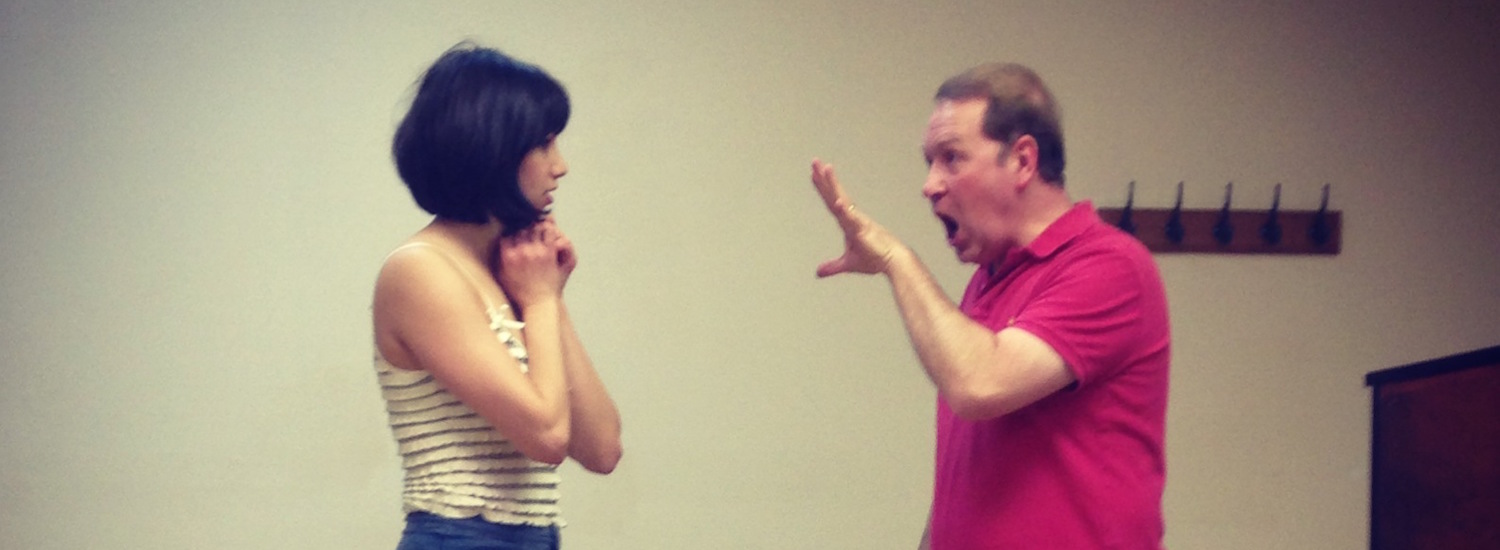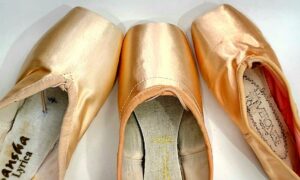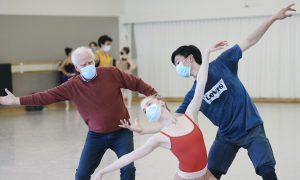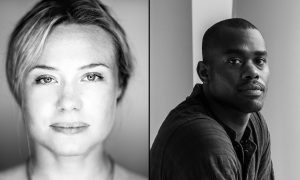The cast of the Tony Award-winning Broadway show, An American in Paris, is comprised mainly of dancers. Some of them, including the show’s two leads, (roles that require much dancing and singing), came from top ballet companies and never before had to do much vocal work on stage. These dancers, along with much of the cast, were transformed into singing dancers. Other shows, too, call for a ton of dancing with also a bit of singing.
Whether it’s ensemble work in musical theater or a dream of a Broadway lead, adding singing to your repertoire can make you that much more marketable as an all-around performer. With some voice lessons can come a little more confidence, more auditions and, in turn, more opportunities and jobs.
Here, Dance Informa speaks with three vocal coaches who work closely with dancers. They explain the benefits of voice lessons and how you can go from a “dancer” to a “dancer who sings”.
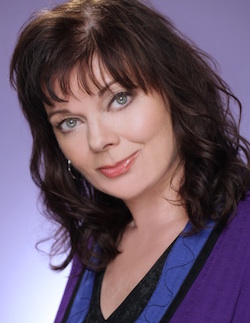
Bettina Sheppard teaches both private and group voice lessons for dancers. Photo by Tess Steinkolk.
“In eras past, a dancer’s singing responsibilities on the musical theater stage were relatively meager, or they weren’t expected to sing at all, as often there was a dedicated singing chorus and a dancing chorus,” explains Stephen Purdy, founder and principal coach at New York Vocal Coaching Studio, and author of Musical Theatre Song: A Comprehensive Course in Selection, Preparation and Presentation for the Modern Performer (released in February and available on Amazon.com). “Since around the late 1960s, however, the dancers in a show have been expected to carry increasingly larger vocal leads and, in many shows, are required to sing with great prowess, especially in the present era. No longer, even in revival presentations of those very old musicals, are dancers a stand-alone entity, leaving the singing to the singers. Dancers are now expected to excel at both, as the two choruses have merged into one.”
Likewise, Bettina Sheppard, artistic director of Sheppard Academy of Vocal Arts and faculty at Broadway Dance Center and City College of New York, points out that dancers would benefit from having some vocal training in the same way that singers should have some dance and movement training. Especially those dancers interested in pursuing a career in musical theater, singing lessons are a must.
“The voice is an instrument to be learned and exercised, and yes, it can be learned!” Sheppard encourages. “If dancers add vocal study, it makes them immeasurably more castable. There are many fine dancers who’ve lost work because they haven’t yet learned how to use their voices.”
Have you ever seen an audition posting that called for “dancers who sing well” and were frightened away? Having some vocal training under your belt could certainly change that reaction. In fact, dancers, who have already spent many years training their body and learning new skills, could have an advantage when it comes to learning how to use the vocal “muscle”.
“I find that dancers have a strong desire to learn to be good singers and are very invested in it,” says Joseph Michael Falduti, vocal instructor at Joseph Michael Voice Studio, for students in northern New Jersey and New York City. “They have a great awareness of their bodies and how things feel, so they’re already off to a great start. In addition, dancers have learned incredible discipline, so they bring a tremendous work ethic to their vocal training.”
Dancers can take voice lessons in either a group or a one-on-one setting, or a combination of the two. While the private lessons may of course be most beneficial, with individual attention, a group vocal class is a good introductory experience, especially if you feel hesitant or nervous. Sheppard, for example, teaches a group class at Broadway Dance Center. Likewise, Purdy teaches a class called “The Dancer’s Voice” through Stage Door Connections in NYC.
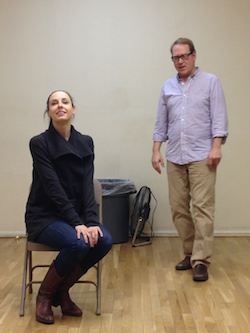
Vocal Coach Stephen Purdy during a session of Stage Door Connections: Dancer’s Voice Seminar. Photo courtesy of Stage Door Connections.
A voice lesson will differ with each teacher, but, for example, Sheppard usually begins with exercises designed to instill muscle memory for proper vocal technique. She likens this to a dancer’s ballet barre – “repetitive physical action to teach, strengthen and reinforce a healthy, strong voice”.
Sheppard then incorporates a short classical piece of music to guide the shape of words. Students can then, over time, begin to build their song repertoire, to be used for auditions.
Sheppard, Falduti and Purdy all teach students and professionals of all skill levels and say that a dancer’s singing progress is individual, very much like in dance technique.
“Regular practice and lots of patience are necessary for a dancer who is new to vocal training,” Falduti says. “If you find that you’re making regular improvements in your vocal coordination, then that is success!”
“Without outside practice to solidify the new behavior and generation of muscle memory, a student will likely find that he or she is taking the same voice lesson over and over again,” Purdy adds. “This is frustrating for both the student and the teacher, so I stress the importance of practice and persistence.”
When attending an audition that requires you to sing, vocal coaches say that confidence, personality and the ability to tell a story are extremely important. In addition, singing “Happy Birthday” may not be the best song selection.
“Singing something like ‘Happy Birthday’ won’t be taken seriously in the professional world,” Purdy explains. “The professional world is far too competitive.”
So how does one select a suitable audition song?
“Pick a song that fits you, not the other way around,” suggests Falduti. “Choose something that sits in your voice well, and change the key if necessary. Look for a song that fits your personality and that you love. If singing the song feels like a chore, get rid of it and find something that feels right! See a coach if you have a hard time finding material. If you’re actively auditioning for professional musical theater productions, you should have a voice teacher who knows enough about the industry and repertoire to give you material that you sing well and that works for an audition.”
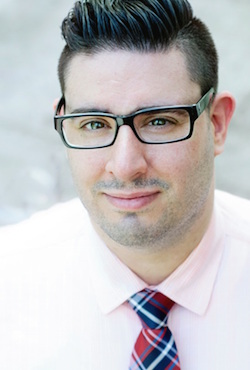
Vocal Coach Joseph Michael Falduti encourages dancers to study vocal technique. Photo by Peter Leigh-Nilsen.
And perhaps just as important as finding a song that goes well with your voice and capability is the ability to act with that song.
“A good vocal audition is really about acting,” Sheppard explains. “We need to tell the story of the song and inhabit the character. Someone who walks in the room with confidence – even if you’re not – and seems to have fun with the character and the story of the song is someone we want to work with. We all have moments of having to concentrate on technical demands, but we need to cover it and keep up a strong acting intention.”
Many vocal coaches enjoy working with dancers, as dancers usually tend to be hard-working and disciplined.
“They are worker bees, go-getters and perfectionists in my experience,” Purdy says, “and these traits make for strong candidates for success in musical theater.”
“I absolutely love teaching dancers,” Sheppard adds. “I’m a very technical teacher, and I find that I’m able to give physical corrections that dancers will move into with ease because they’re used to taking that kind of adjustment. A dancer also has physical strength and control and hopefully an understanding of anatomy. And, most always, a strong work ethic and sense of joy.”
Practicing your vocal technique, especially under the direction of a vocal coach, can keep you marketable and relevant in the performing arts world, but it can also enable you to stay vocally healthy.
“It’s easy to damage your voice if you sing with any strain,” Sheppard says. “Pain or discomfort is your body’s way of telling you something is wrong, and you should never just ‘work through it’. A teacher is able to identify the problem and help you with the necessary corrections. Really this is buying you more freedom of choice in your professional life. The more versatile you can be, the better chance of a long and satisfying career.”
By Laura Di Orio of Dance Informa.
Photo (top): Vocal Coach Stephen Purdy during a session of Stage Door Connections: Dancer’s Voice Seminar. Photo courtesy of Stage Door Connections.


